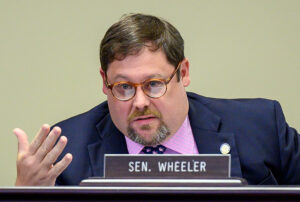Regina Quillen becomes emotional recounting her Eastern Kentucky neighbors' housing conditions. (Kentucky Lantern photo by Liam Niemeyer)
FRANKFORT — Without the help of a friend, Regina Quillen doesn’t know where she would go.?
She lost virtually everything in her Letcher County home, a place that her father built and where she raised her children for 23 years, in the deadly flooding that hit Eastern Kentucky in July 2022.?
She invested thousands of dollars into repairs with federal financial aid and was getting ready to move back into the home, only for it to burn down at the beginning of last year due to an electrical fire.?
But she still considers herself “blessed” when comparing the housing situations of her neighbors in Letcher County. A local nonprofit housing builder Homes, Inc. recently broke ground on a new home for her, the 19th home the nonprofit has built, and a friend of hers has let her stay in a rental property for the time being.?
“If this wasn’t a family friend who had a home that she did not want to rent out …I don’t know what we would have done,” Quillen said.
Working as a case manager in her community and through her personal connections, Quillen knows people living under bridges and in flood-damaged homes with mold and holes in the walls and caved-in ceilings.
“They have no other option. They have nowhere to go. My heart breaks for them,” Quillen said. ”We desperately need something.”?
Quillen’s story of her county’s stark housing shortage was among those shared by affordable housing advocates Tuesday morning to highlight housing needs across the state and call on lawmakers for a substantial financial investment in tackling the issue.

The coalition of advocacy and housing groups included Kentucky Habitat for Humanity, the Homeless and Housing Coalition of Kentucky, the Federation of Appalachian Housing Enterprises (FAHE) and the Louisville-based Coalition for the Homeless.?
The main ask: $200 million to go into housing trust funds for rural communities and the state’s two largest cities to provide reliable funding for housing construction and rehabilitation.?
Rents rising in Louisville, Lexington
“??I think we need funding now to stop the bleeding of population from our disaster-struck areas,” said Andrew Bates, an advocacy associate with FAHE. “As well as to prevent the rent situation in Lexington and Louisville from really skyrocketing out of control.”?
According to one analysis, Lexington rent price increases at one point last year outpaced rent increases in much larger cities including New York City, Boston and Washington D.C. The pace of rent increases in Louisville ranks among the top ten metros for year-to-year growth, according to some analyses.?
In the wake of the 2022 Eastern Kentucky floods and 2021 Western Kentucky tornado outbreak, housing advocates last year had called for $300 million over two years, asking the state to tap the billions of dollars in the state’s Budget Reserve Trust Fund, also known as the “rainy day” fund, to provide funding to rebuild housing following the natural disasters.?
Advocacy groups are again calling on the legislature to tap into the record “rainy day” fund balance to invest in housing and other needs.

House Speaker David Osborne, R-Prospect, has said he expects monies to be spent from the “rainy day” fund in the two-year state budget that will be adopted during this session, but has declined to detail what for or how much.?
The GOP-controlled legislature responded to advocates’ calls last year by creating a new housing trust fund specifically geared for rural housing needs and placing $20 million into the fund. While the funding was a far cry from what advocates had called for, advocates applauded the appropriation.?
Hundreds of millions of dollars of federal funds from the U.S. Department of Housing and Urban Development is also going toward rebuilding housing stock lost after natural disasters on both ends of the state, though state officials have said such funding doesn’t come close to meeting the unmet housing needs. An analysis by the National Low-Income Housing Coalition found that Kentucky lacks nearly 90,000 affordable rental homes to meet current housing demands.?
Bates, the advocacy associate with FAHE, said funding coming directly from the state would have more flexibility on its use compared to incoming federal funding for housing which has a “one-size-fits-all” model.?
“There was not enough appetite in a non-budget year to open the budget to do that level of investment,” Bates said. “What we’re trying to do this session is lean into the vehicle that the legislature did give us, which is the Rural Housing Trust Fund.”?
Tax credit touted for new housing?
One housing developer says not much housing is being built in the state’s largest cities, something that’s also reflected in rural communities.
Andrew Hawes, the president of the nonprofit affordable housing developer Housing Partnership in Louisville, said construction of single-family homes has decreased significantly in Louisville and Lexington, leaving rents to increase in recent years for the housing that exists.
“The rising costs across all aspects of housing development disproportionately affects the most vulnerable and creates a breeding ground for homelessness,” Hawes said. “Urban areas are facing a dire housing crisis.”?
He also said with an influx of economic development and jobs announcements coming to the state, the legislature should consider a tax credit targeting new housing for a growing workforce which would “almost double the number of housing units produced per year.”

Housing advocates are also calling for legislation to allow for the expungement of evictions to help tenants secure housing and also provide no-cost birth certificates to homeless adults to have identification to help secure housing.?
Sen. Phillip Wheeler, R-Pikeville, one of several lawmakers who attended a luncheon with housing advocates on Tuesday, said he was open to the idea of allocating more funding toward housing this legislative session.?
“I definitely want to do anything I can to make sure that, you know, folks who are displaced by the flood can get back into a comfortable home stay in the area,” Wheeler said. “We have to do it in a way that is reasonable and financially practical.”
YOU MAKE OUR WORK POSSIBLE.